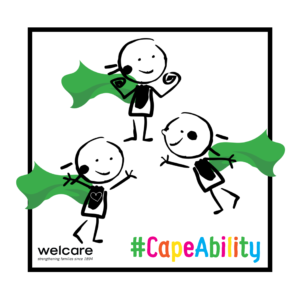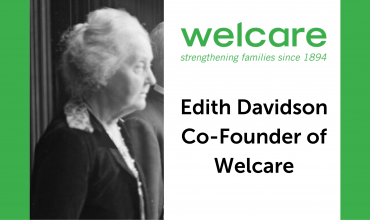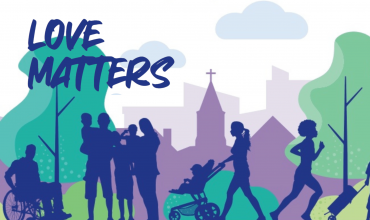“External appearances can tell you very little about the struggles someone faces behind closed doors.”
For Mental Health Awareness Week, Anna Khan, CEO of Welcare gave a talk at St Mary with St Alban, Teddington, as part of a series of local ‘Tedd talks’.
The topic of mental health in young people is particularly pertinent to Welcare, as we strive to help the next generation build their emotional health, resilience and well-being. It is also a topic close to the hearts of many at Welcare. Over a long career, says Anna, “I [have] learnt that external appearances can tell you very little about the struggles someone faces behind closed doors.”
Mental health in young people
Surveys suggest that more children and young people have problems with their mental health today than 30 years ago. “That’s probably because of changes in the way we live now and how that affects the experience of growing up” says Anna.
- Depression affects more children and young people today than in the last few decades, but it is still more common in adults. Teenagers are more likely to experience depression than young children.
- Self-harm is a very common problem among young people. Some people find it helps them manage intense emotional pain if they harm themselves, through cutting or burning, for example. They may not wish to take their own life.
- Generalised anxiety disorder (GAD) can cause young people to become extremely worried. Very young children or children starting or moving school may have separation anxiety.
- Post-traumatic stress disorder (PTSD) can follow physical or sexual abuse, witnessing something extremely frightening of traumatising, being the victim of violence or severe bullying or surviving a disaster.
- Children who are consistently overactive (‘hyperactive’), behave impulsively and have difficulty paying attention may have attention deficit hyperactivity disorder (ADHD). Many more boys than girls are affected, but the cause of ADHD aren’t fully understood.
- Eating disorders usually start in the teenage years and are more common in girls than boys. The number of young people who develop an eating disorder is small, but eating disorders such as anorexia nervosa and bulimia nervosa can have serious consequences for their physical health and development.
Welcare’s work with young people
At Welcare we see the impact of mental health problems affect about 1 in 10 children and young people. They include depression, anxiety and conduct disorder, and are often a direct response to what is happening in children’s lives. Alarmingly, however, 70% of children and young people who experience a mental health problem have not had appropriate interventions at a sufficiently early age.
“The emotional wellbeing of children is just as important as their physical health. Good mental health allows children and young people to develop the resilience to cope with whatever life throws at them and grow into well-rounded, healthy adults.”
Welcare is about to mark 125 years of working with vulnerable children and families, offering practical and emotional support in times of need – problems such as financial or health crises, domestic violence or relationship breakdown. It is that ongoing emotional support which is important now perhaps more than ever, as we see increasing numbers of children and young people experiencing mental health problems.
Welcare’s work with families helps foster healthier bonds and ways of relating. “The importance of secure attachments,” Anna stresses, “and of good endings – applicable to all relationships. The impact of relationship breakdown on children and teenagers can be mitigated when handled well and in a united way by parents.”
Across five centres, a team of social workers and trained volunteers work with families and young people who have been referred to Welcare, not only to help them ride out the immediate problems they face, but to equip them with the tools they need to thrive going forward.
Helping children and young people to build their emotional wellbeing
Things which can go a long way to helping young people build emotional wellbeing and resilience include:
- Good physical health – eating a balanced diet and getting regular exercise
- Having time and the freedom to play, and especially getting outdoors in the fresh air
- Being part of a family that gets along well most of the time
- Going to a school that looks after the wellbeing of all its pupils. Many of the schools Welcare work with run excellent information sessions for parents about a range of issues including social media use of social media, gaming, etc. These can be very helpful to parents who aren’t digital natives and provide helpful discussion with other parents.
- Taking part in local activities for young people – groups including scouts, guides, Duke of Edinburgh Award scheme etc. Participation in a group outside school presents an opportunity to develop new friendships.
In our work with children and young people we look for and encourage the above behaviours, and focus on ways to boost other factors which can be just as important, including:
- Feeling loved, trusted, understood, valued and safe – being trusted to undertake tasks
- Being interested in life and having opportunities to enjoy themselves – music, dance and theatre groups provide opportunities for creativity
- Being hopeful and optimistic
- Being able to learn and having opportunities to succeed, being able to challenge themselves and take risks – this is vital to build confidence and esteem
- Accepting who they are and recognising what they are good at
- Having a sense of belonging in their family, school and community
- Feeling they have some control over their own life – making decisions about how to spend money and choices about how to dress, and make mistakes!
- Having the strength to cope when something is wrong (resilience) and the ability to solve problems
- Opportunities to ‘fail’ safely and to realise that no-one is happy all the time
Read about a recent OurPlace group activity, where children have been given the responsibility of tending to their own section of garden here.
CapeAbility
Welcare’s latest fundraising campaign, CapeAbility, emphasises this support, centring on the themes of Thrive, Care & Inspire. “CapeAbility is an important campaign,” says Sarah Cahill, Welcare Communications Officer, “because it turns that old image of a helpless child on its head – boosting their strength with a superhero cape, empowering the children we work with to build their own resilience and look forward in a hopeful and positive way.”
Read more about CapeAbility below.
Final Thoughts
Anna rounded off her talk with some final thoughts:
“I was struck by the comment by Geoff Mulgan, former head of Number 10 policy unit, that ‘well-being will be the major focus of government in the 21st century in the way that economic prowess was in 20th century and military prowess in the 19th century’. I feel passionately that in the same way safeguarding is everybody’s business, so is building emotional health and well-being in the next generation. This is one of the key factors influencing our #CapeAbility campaign, encouraging children to develop strategies to thrive, care and inspire others.”
As Welcare celebrates its legacy thus far, and looks to the future of working with a new generation of service users and supporters, we want to keep mental health at the forefront, remembering that we all need that extra care sometimes.









